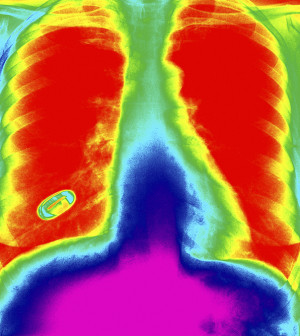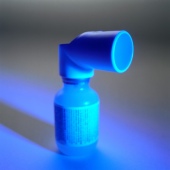- Could Your Grocery Store Meat Be Causing Recurring UTIs?
- Are You Making This Expensive Thermostat Error This Winter?
- Recognizing the Signs of Hypothyroidism
- 10 Strategies to Overcome Insomnia
- Could Artificial Sweeteners Be Aging the Brain Faster?
- Techniques for Soothing Your Nervous System
- Does the Water in Your House Smell Funny? Here’s Why
- Can a Daily Dose of Apple Cider Vinegar Actually Aid Weight Loss?
- 6 Health Beverages That Can Actually Spike Your Blood Sugar
- Treatment Options for Social Anxiety Disorder
Work-Related Asthma Affects Millions of U.S. Adults: CDC


Wheezing and coughing on the job from work-related asthma is more common than you might think, according to a new U.S. health report.
Almost 16 percent of American adults with asthma either developed the condition on the job or have asthma symptoms made worse by conditions in their workplace, said Dr. Jacek Mazurek, lead author of a new report from the U.S. Centers for Disease Control and Prevention.
That adds up to an estimated 1.9 million cases of work-related asthma in the 22 states that were part of the CDC study.
“Work-related asthma is associated with increased disability, mortality, and adverse social and economic outcomes,” said Mazurek, a lead research epidemiologist with the division of respiratory disease studies at the U.S. National Institute for Occupational Safety and Health.
Many people who have asthma flare-ups at work experience poor quality of life, loss of income and unemployment, he added.
The new findings are published in the April 10 edition of the CDC’s Morbidity and Mortality Weekly Report.
Overall, about one in 10 Americans has asthma, researchers found.
Rates of work-related asthma for on-the-job adults range from 23 percent in Missouri and 21 percent in Wisconsin down to 9 percent in Hawaii, according to CDC poll data gathered from 22 states in 2012. Twenty-one of those states had rates higher than 13 percent.
Asthma attacks occur when the airways constrict in response to some sort of environmental irritant, according to the U.S. National Institutes of Health. Triggers can include allergens, dust, smoke, fragrances and chemicals.
There are two main types of work-related asthma, said Dr. Susan Tarlo, a respiratory physician and a professor of occupational and environmental health at the University of Toronto’s Dalla Lana School of Public Health.
Asthma that has been caused by work conditions is called occupational asthma, while existing asthma that is triggered by conditions at work is called work-exacerbated asthma, Tarlo said.
“Work-exacerbated asthma is much more common,” she said. “We’ve seen a decline in occupational asthma over time, but work-exacerbated asthma has continued to be common.”
A wide array of jobs potentially bring people into contact with these triggers, Mazurek said. These include positions in industrial plants, metal machine shops, welding shops, hospitals and laboratories, woodworking and furniture-making shops, and hair and nail salons.
Even department store staffers are at risk for work-related asthma, thanks to the perfume counter, said Dr. Len Horovitz, a pulmonary specialist at Lenox Hill Hospital in New York City.
“They’re spraying samples of perfume at you in department stores, and that’s definitely a chemical irritant,” Horovitz said.
House cleaners and maid services also carry a certain risk of work-related asthma, because of the dust in houses and the cleaning solutions they use, he added.
If you’re suffering from work-related asthma, what’s the solution? In extreme cases, you might have to look for a new gig, Mazurek said.
“For some patients with work-related asthma, it may be necessary for clinicians to remove or restrict the patient from direct or indirect contact with exposure in the workplace,” he said.
Horovitz thinks that’s impractical for most people.
“Jobs aren’t that easy to find these days,” he said. “If the job is satisfactory for you, you should try to minimize your exposure to triggers in the workplace.”
You can try wearing a protective breathing mask when the job will expose you to triggers, and talk with your employers about improving ventilation in the work space, Horovitz said.
It also might help your work-related asthma if you reduce the triggers in your home, he added. For example, you can pull up dust-laden carpeting and replace it with linoleum or tile, which is easier to keep allergen-free.
More information
For more on asthma, visit the U.S. National Library of Medicine.
Source: HealthDay
Copyright © 2026 HealthDay. All rights reserved.










